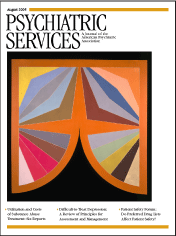Abstract
OBJECTIVE: This article reviews the concept of difficult-to-treat depression and outlines some principles of pharmacologic management. METHODS: The authors conducted a MEDLINE review for the years 1999 to 2004, using the key words refractory, resistant, and difficult-to-treat depression. RESULTS: Only a small body of evidence-based literature exists to guide the management of difficult-to-treat depression. Nevertheless, clinicians often need to make treatment decisions in the absence of clear data. Depression should not be considered resistant, refractory, or difficult to treat in the absence of trials in which an appropriate drug is given in a dosage and duration sufficient to produce a response. Nevertheless, inadequate antidepressant trials are a relatively common phenomenon. Nonresponse may also result from pharmacokinetic or pharmacogenomic factors. Principals for assessing difficult-to-treat depression include preventing pseudo-resistant cases, recognizing that finding the best treatment option is a process, developing a systematic step-by-step approach, and preserving hope. A review of the literature demonstrated a two-step approach for managing difficult-to-treat depression. The first step is to evaluate for factors that contribute to nonresponse, such as comorbid medical and psychiatric conditions. The second step involves using the four classical strategies for enhancing antidepressant efficacy: optimization, augmentation, combination, and switching. CONCLUSION: Advances have been made in the treatment of depression, but a great deal more research needs to be done. It is hoped that new alternatives and promising developments in methods will contribute to the improved management of what we now call difficult-to-treat depression.



